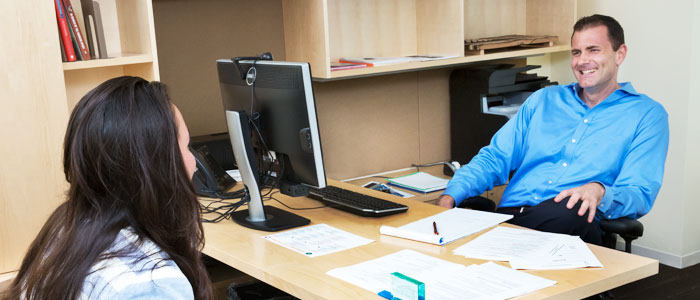
Programs & Services
Transition & Academic Services
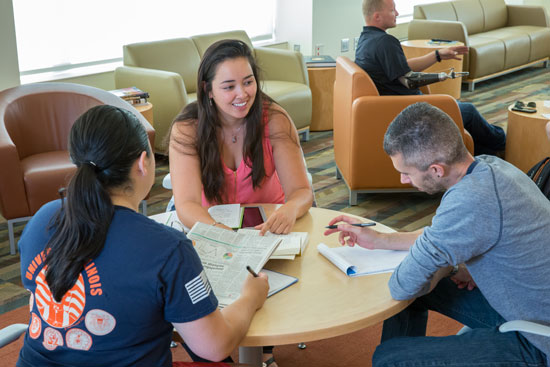
The transition from a military environment to a college or university can be difficult and overwhelming for student veterans, especially for those with a disability. These services will include individualized academic coaching and tutoring that will aid in monitoring progress and addressing barriers. Specialized coursework will assist in orienting student veterans with disabilities to university processes, procedures and the new environment, as well as develop strategies for disability self-management.
- Testing & academic accommodations
- An innovative first-year course for veterans
- Note-taking and tutoring
- Click here to see available online courses

Benefits & Outreach Services
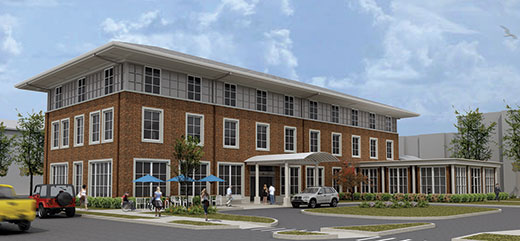
Navigating the benefit programs for student veterans can be daunting. These services will facilitate access to their entitled benefits and address their financial needs. Individualized financial aid and benefits counseling will be provided by a VA VetSuccess on Campus counselor and financial aid certifying official to ensure the student veterans understand their benefits and receive all that they are entitled to.
- Post-9/11 GI Bill and Montgomery GI Bill
- Illinois Veterans Grant
- Vocational Rehabilitation and employment
- Learn to maximize your benefits

Peer Mentoring
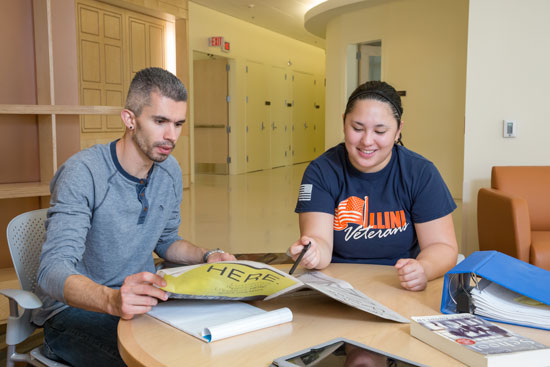
Who are our Vet Connect mentors?
Vet Connect Mentors are trained student veterans who are academically successful and have been on campus for at least one year. They are familiar with assisting incoming veterans with their transition and are trained in communication skills, problem-solving, disability management and veteran-specific resources on campus and in the community.
Want to get involved?
Have more questions about being a Vet Connect Mentor or Mentee? Please contact Nicholas Osborne for more information.
Remember reporting to your first duty station and being assigned a unit sponsor who showed you the ropes? Vet Connect is an excellent way to link-up with currently enrolled student veterans who can assist with your transition to the University of Illinois. Vet Connect mentors can provide campus tours, introduce you to other students and members of the Illini Veterans student organization, answer questions about your transition and coordinate other support to help you feel at home.
Why is a mentor important?
- Vet Connect mentors have been there and done that. They understand both military and university culture and can relate to your transition
- Get information from a reliable source. You probably have a lot of questions about being a student – from University and VA policies to the best places to live, grocery shop, or study
- Expand your network. Mentors provide firsthand experience on career fairs, professional development workshops and campus opportunities that enhance academic and professional interests
- Get firsthand perspective on how to manage a disability from someone you can relate to.
- Find community. Your mentor will introduce you to other veterans and keep you informed of the various social and philanthropic activities that are offered
- Be successful. Keep in mind that the more connected you feel to the campus, the more likely you are to stay enrolled and make progress on your degree

Health & Life Skills Services
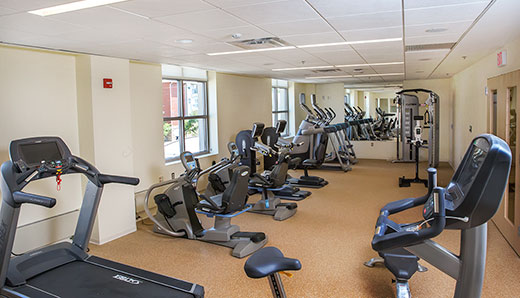
Student veterans with newly acquired injuries are just beginning to develop an understanding of how their disability may affect their learning and integration into their new lifestyle. To support sustained health and functional management of their disabilities, these services will provide clinical diagnostic services and then follow up with education on healthy lifestyle strategies, nutrition, fitness, and adapted technologies to improve quality of life.
- Neuropsychological testing
- Health and fitness
- Disability management

Career & Employment Services
For veterans who sought a career in the military but were discharged due to injuries, the prospect of identifying and being prepared for a satisfying civilian career is exceptionally challenging. These services will help with career planning, translating military experience, internship and volunteer opportunities, targeted career fairs and professional development, and employment assistance.
- Career assessment testing
- Skills translator - translating military experience into civilian language
- Professional mentoring
- Resume writing, mock interviewing techniques, career fairs and professional development
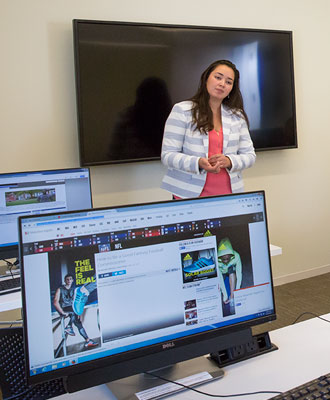

Counseling & Family Services
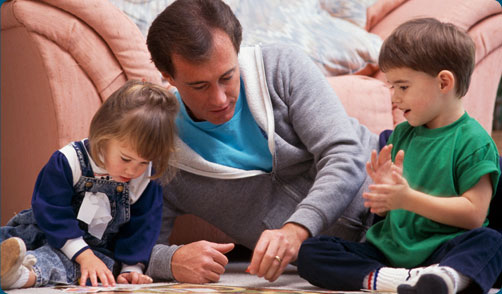
A guide to family reintegration can be found here.
Military families can face intense challenges under normal circumstances. Lifestyle changes for the disabled student veteran impact the entire family. The family's adjustments and transitions need attention as well. These services will provide psychological, marital, and family counseling directed at the student veteran, their spouse, and children. Intentional family events and activities will be offered to enhance family well-being.
- Individual and group counseling
- Family counseling
- Readjustment and reintegration strategies
- Anger management
- Alcohol and other drugs counseling

VA Services
For military-connected students that qualify for services through the Department of Veterans Affairs, the Center can provide the following assistance onsite:
- Vet Success on Campus (VSOC) – our VSOC Counselor, Jason Abrams, provides vocational rehabilitation to student veterans that have service-connected disabilities. While his main focus is Voc Rehab, Jason can assist all veterans in areas such as tutoring, vocational testing, employment services, and issues that arise related to billing and financial aid. Jason is a great resource for anyone looking for information about how to navigate, understand, and keep track of their VA benefits.
- Social Work – the Center can help with enrollment or transfer into the VA Healthcare system, assist with finding a primary care provider or specialist, schedule appointments around your class schedule, and answer questions and address issues you’re having with the VA.
- Psychological – the VA can see a veteran for any mental health-related problem; however, the Center has psychologists from the VA PTSD Clinic and who possess specialized training in evidence-based treatments for PTSD and Military Sexual Trauma.
- Physical Therapy – this service is designed to remediate impairments and promote mobility, function, and quality of life through examination, diagnosis, prognosis, and physical intervention.
- Speech and Language Pathology – this service provides a spectrum of support including note-taking, reading comprehension strategies, study skills, and test-taking strategies for any type of cognitive problem/difficulty (attention/concentration, memory, and/or language). The Speech Therapist is also able to provide note-taking tools (smart pens), as well as information on deployment-related factors that affect school performance.
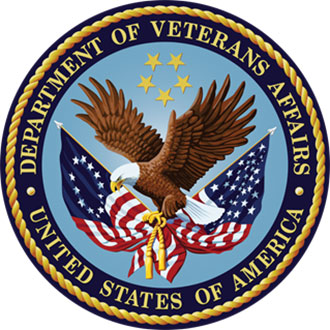
For more information on these services, please contact Dr. Katie York: cshart1@illinois.edu

Residential Services
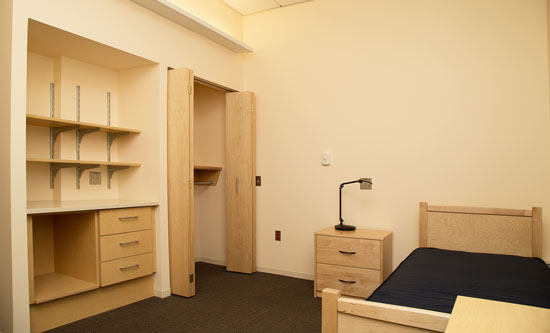
The Center’s third floor houses 14 fully accessible private suites with individual bathrooms. For military-connected students who want to live within a peer community, this is an excellent housing option that is conveniently located on campus. For students with severe disabilities or for those transitioning from medical rehabilitation facilities, personal assistants and a SureHands ceiling lift system can also be made available.
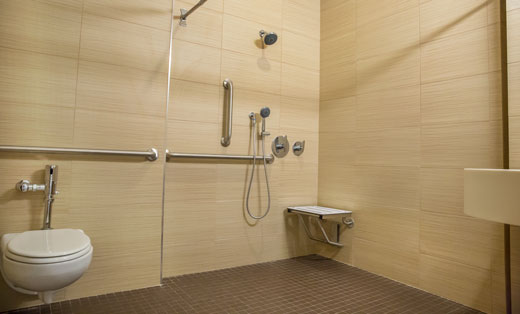
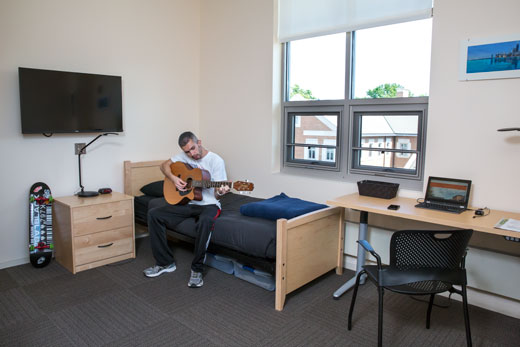

Research Services
Research connected to veterans with disabilities is critical to improve the services provided and enhance the quality of their lives and the lives of their families. The Center will be a place to explore innovative methods, develop new assistive technologies, test important questions, and discover treatments in a wide variety of disciplines. Dissemination of these results may potentially benefit all persons and families with disabilities.
- Interdisciplinary
- New collaborations & partnerships
- Student involvement as research assistants
- Leading the way in cutting edge technology
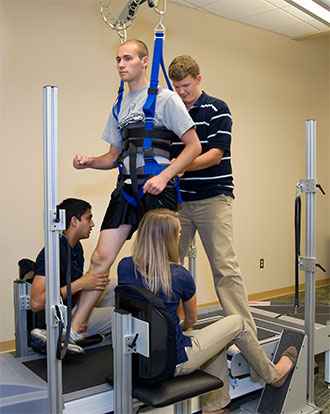

- Center for Wounded Veterans in Higher Education
- College of Applied Health Sciences
- University of Illinois at Urbana-Champaign
- 908 W. Nevada Street / MC-090
- Urbana, Illinois 61801
- Phone 217-300-3515
- Fax 217-244-9008





